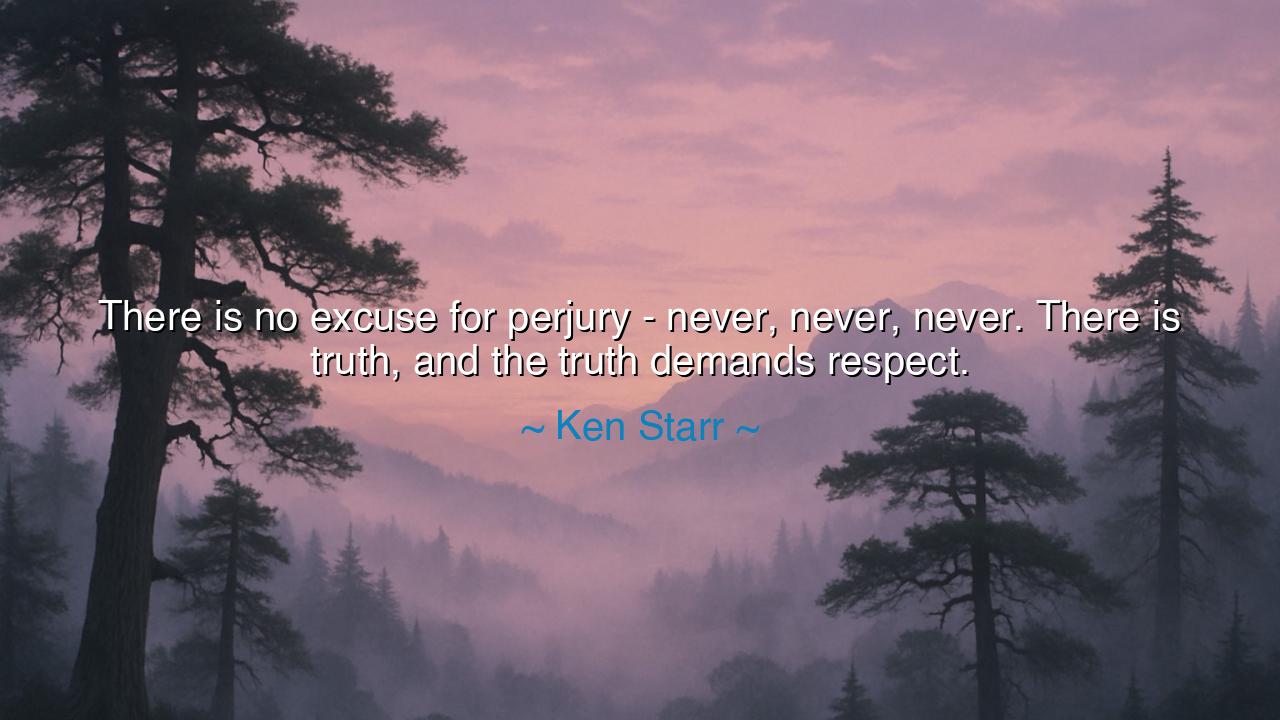
There is no excuse for perjury - never, never, never. There is
There is no excuse for perjury - never, never, never. There is truth, and the truth demands respect.






In the voice of Ken Starr we hear the thunder of an eternal law: “There is no excuse for perjury—never, never, never. There is truth, and the truth demands respect.” These words cut like a blade through the fog of compromise and deceit. They remind us that lies spoken under oath are not mere words but betrayals of justice itself. To swear falsely is to corrupt the sacred covenant between man, law, and conscience, and to place self above the order of truth.
The word perjury is ancient, born from the Latin perjurium, meaning to swear falsely before the gods. In every civilization, from Rome to Israel to the courts of England, to lie under oath was considered among the gravest of sins. Why? Because the law itself is built on trust, and without trust, no judgment can be fair, no justice can be real. Starr’s insistence that there is “never, never, never” an excuse for it is a call to remember this unbroken chain of wisdom—that society collapses when truth is discarded.
Consider the fate of Socrates, who stood before the judges of Athens. He refused to flatter, refused to twist words to save his life. Instead, he spoke plainly, choosing death over dishonor. His example shows us the opposite of perjury: a devotion to truth even at the cost of life. He could have lied, he could have made excuses, but he knew that once truth is abandoned, the soul itself becomes corrupted. Thus, the respect we give to truth is not only for the sake of law, but for the sake of our very humanity.
History offers darker examples as well. In the trials of perjurers who falsely testified against the innocent, we see lives destroyed, families ruined, and justice mocked. Think of the Salem witch trials, where false oaths and deceit condemned many to death. Here, the lack of respect for truth poisoned an entire community, leaving a legacy of shame. Starr’s words strike against such tragedies: there is no excuse, no justification, no higher good that comes from falsehood sworn in the name of justice.
But what of the phrase, “the truth demands respect”? This is no passive command—it is an active duty. To respect truth is to recognize it as a force greater than ourselves, a light that burns even when we would prefer darkness. To distort it for convenience, to bend it for advantage, is to show contempt for the very order that binds human beings together. Respecting truth means honoring it even when it condemns us, even when it costs us, even when it humbles us.
The lesson is clear: in our courts, in our homes, in our daily lives, there can be no excuse for lies disguised as truth. Each time we speak falsely, especially under sacred oath, we weaken not only the trust of others but the integrity of our own souls. To live rightly is to live truthfully, for the truth is not fragile—it is eternal, and it is owed our respect.
Therefore, take this wisdom into your life. Do not excuse small lies, for they grow into greater ones. Speak truthfully in all matters, and especially when the stakes are high. If ever you are called to give account, let your words align with reality, for though truth may cut sharply, it also heals deeply. Remember Starr’s charge: never, never, never betray the truth, for it is the foundation upon which justice, honor, and human dignity stand. And if you honor it, you too will be remembered as one who stood not with falsehood, but with the eternal strength of truth.






AAdministratorAdministrator
Welcome, honored guests. Please leave a comment, we will respond soon